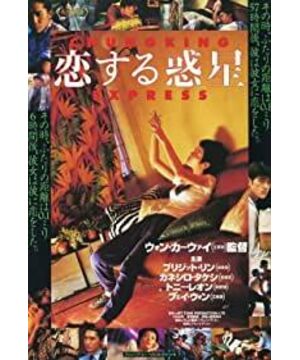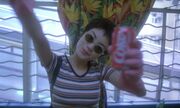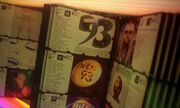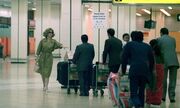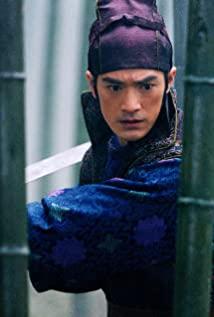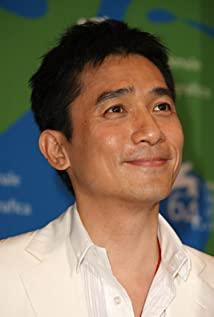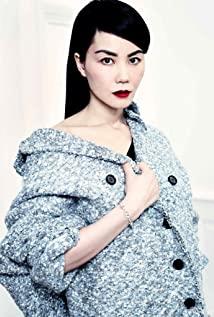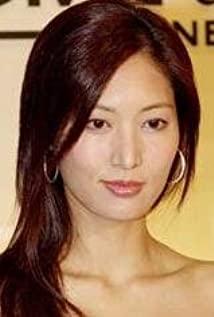All the wolves in Wong Kar-wai's films should go inward. Brigitte Lin fled in the manic clip of Hong Kong's neon and wasteland where the two images merged into the streets and alleys, pulling people directly into a different space where post-colonial and post-industrial mixed. Off-screen string music and singing, filling up the residual heat of the city's high density, competing to splash in the game of chasing and fleeing. Wong Kar Wai always tries to paint such a dazzling theme, which is about the city and love, cigarettes and fine wine.
Takeshi Kaneshiro was bewildered, bewildered, and fell into self-pity. Compared with Tony Leung groaning about things at home, Takeshi Kaneshiro roaming between the shelves seems more interesting. The bottles and jars on display reflect a certain difficulty in choosing, or in other words, it is also the complex mirror language of the city's human heart, using a so-called "mechanical reproduction" imitation aesthetic to concoct a profound and sensible city. fable. The principle here is the pop image of Andy Warhol, like the giant wallpaper with densely arranged cans. When everything in the world is incorporated into the consumption logic, the visual grotesque, but there is no lack of beauty, is obsessed with the world of sound and light. It is a cultural symbol of desire for animal sharing.
For people like Takeshi Kaneshiro who was besieged between the shelves of 7.11, people and things in this era share common logic rules, and love is also included in it without exception. Everything has a deadline, the old bottle is replaced by a new one, and the management method of the cashier at the counter can't help but tell the cruel laws of urban love. As a result, there was such a faint and incomprehensible feeling of empathy between "I" and canned pineapple, and this empathy was also the self-pity consciousness that Kaneshiro warriors indulged in secret.
But maybe even Kaneshiro Takeshi himself didn't realize that he actually liked this kind of self-deprecation faintly. In all of his monologues, I saw that there were fewer really sad, maddened and dying "lovelorn voices", but more private intoxication implied in the language, like a long self-care, full of Some kind of "kitty" pose. More often, he is sentimental for sentimentality itself, lyrical for lyricism itself, and is infatuated with the self-imposed tragic stories and imaginary "daffodil complex".
And the people in "Chongqing Forest" don't seem to be satisfied with their own narrow waters. Is Brigitte Lin's blonde hair related to the foreigner who likes "big golden waves"? Who is Tony Leung wearing in blue (a symbol of freedom and melancholy)? If he is really addicted to his own body, why does he always love him? Drunk and then chaotic behavior? The logic of dressing up/acting is fun, it's both smug complacency and self-loathing dissatisfaction, exhibitionist exposure and divisive hiding. It sweeps outwards and rolls inwards.
Perhaps it is a quiet deformation of the narcissism complex under the logic of consumerism, because everything is changing rapidly, and the object of self-reflection should also change in time, otherwise love will inevitably become boring after a long time. Consumerism's "production" of desire can also be understood as a kind of "awakening" of narcissism. The "big golden wave" wig, which was later worn, glowed with the long stare of the "foreigner" (self-fall in a post-colonial context), and the uniform separated social identity and self - when Tony Leung put on blue Uniform, he incarnates "Police 663" (numbers are about a kind of modernity, as well as the secret and budding flirtatious messages of this discourse), Faye Wong wears a red bow tie and wraps a tight shirt, it is all over the world The flight attendant, a brand-new self with a brand-new identity role-playing, cut off the old disturbing thread, but also re-weave the blurred fantasy about the self-identity pattern, which sneaked into the ambiguous words about sex, entangled kinks, Stare and peep. As for the classic medium shot, I aimed at Liang and Wang, who were on both sides of the salad counter, while the crowd of people around them flickered, turning into an abstract colored light pattern under a super long exposure. Two infinitely narcissistic individuals, separated from the vast crowd, riotously performed in the center of the stage set of Gaoguanghuiji.
Fetish Wong Kar-wai has hidden too many ambitions in the process of constructing the labyrinth of urban symbols. I often can't tell his exact attitude towards this flashy world: he always pity these individuals, like the two fateful and tragic floating Wan Chai in "Mong Kok Carmen", the heroic righteous wandering in the rivers and lakes in "Evil in the East", all of them People are lonely and isolated to the extreme; and he loves those audio-visual symbols overflowing with desire, the food and wine in "Blueberry Night", the cigarettes and clothes in "In the Mood for Love", sex and love. All this torture also enriches the world. "Chongqing Forest" includes the above two attitudes, the sadness about the eternal absence and dislocation of love, the care for urban men and women trapped in mysterious choices, and the play with the world of flowers and flowers in the glazed world.
Takeshi Kaneshiro, Tony Leung, Faye Wong and Brigitte Lin are all Narcissus who have pity on the mirror. When they tried to call for help from the forest, the only response to them was the voice of ECHO.
View more about Chungking Express reviews


